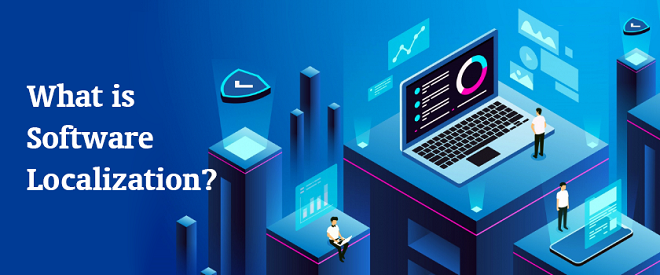It’s undeniable that English is the most common language used on the Internet. While that is the case, English-speaking users only account for approximately 26% worldwide. That is why software written in English sometimes creates a barrier between service providers and their clients.
This poses a challenge when you intend your software to be disseminated to consumers all over the world. If you’re a software company trying to increase your reach globally, you should consider software localization.
If you’re new to the term, read on to find out everything about software localization and why you need it.
What Is Software Localization?

As the name suggests, software localization is the process of adapting a software to a specific language and culture. This process modifies the content of the software for it to be more appealing to a specific location.
This is not to be confused with language translation. Although this process covers translation, it goes beyond that. The translation part is just one aspect of an effective software localization process.
It can be as simple as changing the font size to fit within the page. It involves everything, even the tiniest detail, that can make a software feel more personal to the user. It takes into account culturally-sensitive features such as symbols and connotations. Aside from that, it also includes changing specific data such as time, date, and currency format.
For example, countries outside of the US don’t use the MM/DD/YYYY date format. Users in these countries can get confused with the data you provided when they access your software.
The localization process is a complex procedure. Ideally, it should be included in the initial stages of software development. This is so that developers can take into account every aspect of coding language that needs to be changed. However, it may not be practical to do so, which will be discussed later in the article.
When done right, users may feel as if the software was made for them. This, in turn, provides multiple benefits to your business.
Why Do You Need to Localize Your Software?
Localization may appear to be pricey at first, but it is critical for the growth of your business. A well-thought-out localization plan can help you achieve your intended ROI sooner than you think.
Here are other ways software localization helps your business:
-
Helps You Reach Consumers Worldwide
In business, one of your goals should be to reach audiences from across the globe. But how can you achieve this if your product isn’t even available in their country? Or it may be, but some aspects of your software are not adapted to their native language.
Software localization services involve careful planning to make sure that software is fit for specific audiences. Translating your content already makes a huge difference when you enter a new market. But factoring in other things such as cultural connotations and avoiding offensive remarks can go a long way.
Potential consumers in your target market will respond positively to such commitment.
Additionally, having a bigger audience means you have more social proof of your services. This boosts your credibility even in the international market
-
Boosts Your Credibility
Gaining and keeping software users requires a reputable image. And to establish credibility, you need to communicate to people in a manner that they are familiar with.
Customers like it when companies communicate with them in their own language. If given the option, even non-native English speakers prefer content written in their native language.
Customizing your product to fit their culture helps potential clients trust you. It sends a message that you are not in it for their money. Instead, they’ll perceive a software firm that genuinely wants to help them solve their issues and will go to tremendous efforts to do so.
This demonstrates that localized software isn’t only about being understood. It’s also about showing respect for local clients. High-quality localization aids in retaining attention and strengthening loyalty. Eventually, this promotes long-term customer connections.
-
Improves User Experience
The truth is the success of your business depends on how you please your customers. They will buy your products if you give them what they need and want. More importantly, they will enjoy a product if they can understand and feel its value. Without these, they’ll look for similar products from other companies.
An effective software localization strategy ensures optimal software functionality and content adaptation. This way, local consumers can understand and profit from your product.
Providing the best user experience promotes user engagement, which then urges them to recommend your product.
-
Provides You With a Competitive Advantage
The software industry is more competitive now than ever, and it will be much more so in the future. It’s one thing to stand out in your own backyard, but that market has its limitations. Planning to break into international markets is a risky move, but it’s going to be worth it in the future.
With a smart localization strategy, you can stand out in international markets and increase your return tremendously.
-
Helps You Save Money in the Long Run
Despite being expensive, software localization can help you cut back on additional expenses. Once your product is out, you may need to invest in product support. However, with a localized product, you can expect a decrease in your need for support staff.
The extra money you saved can be reallocated to other important aspects of your company.
When Should You Localize Your Software?
A successful software localization project can benefit your company. However, it’s usually not feasible to start localizing your software.
For example, if your software caters only to a specific region, there’s no need to localize it. While that is the case, you need to determine if there are populations in your area that need localized content.
If you’re living in the US, chances are there are minority language communities within the country. According to Statista, there are over 41.7 million people living in the US who are native Spanish speakers. It’s best to take them into account and provide them with localized software to increase your sales.
It’s also not a wise idea to perform localization if it’s your first software offering. It’s more practical to concentrate on your own region at this time. But this does not mean you should forget about localization. You can always plan to localize your program later.
What you can do is prepare your software for future localization. You can introduce foreign characters and number file formats at this stage to lessen the workload later. When the time comes that you need to localize, you can get it done in a short amount of time.
On the other hand, start the localization process if you want to expand your user base or break into a new market. Incorporate the best practices for software localization into your process to expand your market reach in the future.
The Bottomline
Software localization is a great investment for expanding your business. It helps you penetrate new markets and attract new users all over the world. Not only that but it gives you a competitive edge in an ever-growing market.
Knowing the basics and benefits of localization is the first step to understanding such a complicated process. But once you do, you’ll be able to provide the best software experience for your user base. Your localized software might even be the start of your journey towards a successful business.

